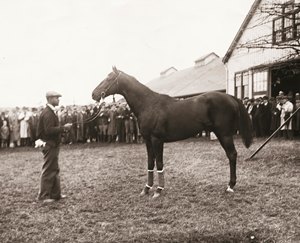BackTrack: Silver Buck Continues a Whitney Tradition


Tradition was served on the first weekend of the Saratoga Race Course meeting, but to the satisfaction of most of the record-breaking thousands visiting the old Union Avenue course in its 120th year, it was only a half portion. The crowd had come to see an exciting young horse, Conquistador Cielo, run in the Jim Dandy (G3), and they wanted to see him win.
Fifty years ago this week, Equipoise, having his finest year at age 4, won the young Whitney Stakes, then weight-for-age, for his young owner, Cornelius Vanderbilt Whitney. On the first weekend of the Saratoga meeting a half-century later, the same Eton blue and brown which Equipoise carried were carried by Silver Buck, a descendant of Equipoise, to another Whitney Handicap (G1) victory for owner Whitney.
Two years before Equipoise won the Whitney, another of America's most famous Thoroughbreds, Gallant Fox, lost the Travers. Along with Man o' War's loss to Upset at Saratoga a decade earlier, the defeat of Gallant Fox and Whichone by 100-1 Jim Dandy became one of racing's most famous defeats.
Gallant Fox' defeat contributed to Saratoga's tradition as "graveyard of champions," and resulted in 1964 in the birth of a new race, named the Jim Dandy. With some irony, the Jim Dandy was scheduled so as to be a prep race for the Travers. The Jim Dandy's very name was enough to make the trainer of an oustanding 3-year-old shudder.
In this year's Jim Dandy, run the day after the Whitney, Conquistador Cielo with a most competent and businesslike performance saw to it that storybook romance was not furthered. A defeat of Conquistador Cielo would have bracketed the winner right up there with Upset, Jim Dandy, and Onion (Secretariat's nemesis in the 1973 Whitney).
Neither owner Henryk de Kwiatkowski nor trainer Woody Stephens seemed unduly concerned. Their 3-year-old, the reigning leader of the division, gave them no reason to be. He won by only a long length, in time just about right for a colt aiming for the Travers (G1) two weeks away, but he could have won by five or six times that margin if jockey Eddie Maple had thought it necessary to shake him up.
Tradition was not served in the 1982 Jim Dandy, but racing class—racing superiority—was.
Around the barn deep on the main track's backstretch, they tell about how C.V. Whitney morning visits to see how his stable of 10 or 11 horses is doing, and pretty soon he will say: "Now, when we had Equipoise, we'd ..." and there often follows some comment from Whitney on the training methods of that day—which were tough.
The training methods for Silver Buck, on the other hand, are not tough.
Few trainers have been better at bringing a horse up to a major objective than Elliott Burch, and Silver Buck has required some forbearance. His races have been well spaced, the objectives picked well in advance. Silver Buck is not hurried.
"We pretty much let him train himself," Bill Burch, his father's assistant, explained. "He's not a glutton, he doesn't fill up. He's a good work horse, does what you want him to do."
After Silver Buck won the Suburban Handicap (G1) in early July, what the Burches wanted him to do was win the Whitney a month later. They passed up the Brooklyn Handicap (G1), Elliott Burch trained him a bit sharper than he had formerly, and the gray son of Buckpasser--Silver True (the mare a third-generation descendant of Equipoise) came out prepared for a top effort.
Silver Buck, while the odds-on favorite in a field of six, carried only 115 pounds, four less than was carried by Winter's Tale, a circumstance that created some comment. Racing secretary Lenny Hale's answer was that he was weighting "a quality horse" in Winter's Tale, which in the past had won such major races as the Suburban, the Brooklyn, and Marlboro Cup (G1) and had indicated recently a return to form after 1 1/2 years of disappointments.
On the other hand, Silver Buck's Suburban stood as his lone stakes win prior to the Whitney, Hale pointed out, and Hale's estimation of this year's handicap division in the East is not complimentary. In essence, the issue of the Whitney imposts was the reverse of "what have you done for me lately?"
All six starters could carry relatively moderate weights because Conquistador Cielo also was a nominee and topped the list, over scale.
Don MacBeth, who won the Suburban with Silver Buck and says he is still learning about the 4-year-old, rode him beautifully in the Whitney. He relaxed him and kept him far back despite a moderate early pace, which put outsider Lord Darnley lengths in front of Tap Shoes, with Lemni Gold and Winter's Tale together in third and fourth places.
Jeff Fell moved Winter's Tale fast on the outside as they rounded the final turn, while Tap Shoes was coming on along the rail. Just after they caught Lord Darnley, Silver Buck loomed outside of them.
MacBeth had moved at the quarter pole, and Silver Buck responded so willingly that he was with the leaders at the furlong pole. He drew away to win by 1 1/2 lengths, with Winter's Tale second, a neck in front of Tap Shoes. (Winter's Tale was second to Fio Rito in last year's Whitney.) The pace had quickened and Silver Buck got the final eighth in a bit over 12 seconds, for a clocking of 1:47 4/5 for the nine furlongs.
C.V. Whitney had his fourth Whitney Stakes win (Equipoise, Counterpoint, State Dinner, Silver Buck). Silver Buck, a good-looking 4-year-old, may race again next year, depending to some extent on how much he accomplishes in Belmont Park's $1,100,000 fall series. Burch concedes that the late-arriving colt still has much to do.
